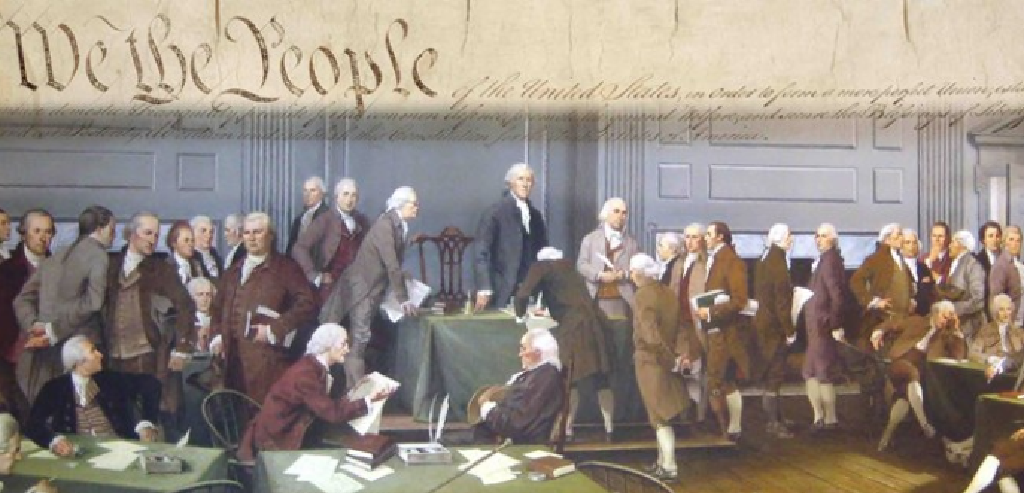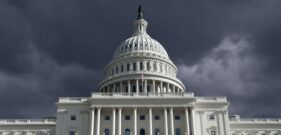The Polylingual Constitution
In a pair of posts for Law and Liberty, I argued that public meaning originalists are not doing a good job of communicating with those beyond their narrow circle—neither the public at large nor scholars in other disciplines. John O. McGinnis and Michael Rappaport both honored me with a response, and both responded with their own version of: while that may be true, it’s not important.
But this indifference to historical expertise beyond the confines of legal history, I still believe, will harm their credibility among the general public and among other experts. I had pointed out that attempts to malign the Framers of the Constitution (in particular, the recent book by Mary Sarah Bilder) will ultimately damage originalism in the minds of a more popular constituency, many of whom harbor originalist sympathies because they admire the Framers.
McGinnis expresses skepticism. Since the public pays little attention to scholarly debate, he says, this claim is akin to saying that “Einstein’s theory of relativity changed everyone’s understanding of basic reality.” He believes instead that “The public is likely to think of the Framers much as they did before Bilder’s book.”
Theories Filter Down
This might be right. Then again, it might be short-sighted. When Woodrow Wilson wrote in 1908 that the Constitution should follow the model of Charles Darwin, rather than being read in the light of Isaac Newton, probably no one but egghead political scientists or legal scholars paid attention. At first. But flash-forward a century, and on today’s college campuses, there’s hardly a student walking into an American politics class who does not assume from the outset that we operate under an elastic “living Constitution.” These students are surprised to learn (if they ever do learn) that the phrase “living Constitution” was a conscious attempt to alter previous understandings of the Founding charter, coined more than 100 years after that charter was ratified. Over time, Wilson’s scholarly theories ended up dramatically shifting the public’s perception of the Constitution.
Ideas have consequences. And while we never know in advance which ones will become consequential, it is both wise and prudent to get them right at the outset.
A falsehood, after all, can get halfway around the world while the truth is still putting on its boots. In the fall of 2015, Bilder first published allegations that James Madison falsified the most authoritative records of the Constitution’s framing. Within months, the Washington Post declared in a headline that Madison had “doctored” his Notes, and Saul Cornell similarly described these claims as an “indisputable fact.” Within a year of its publication, Madison’s Hand had won the Bancroft prize, and Michael Klarman not only repeated many of Bilder’s charges against Madison in his 2016 popular history, The Framers’ Coup, he even exaggerated some of them. At this rate, it should not take long before the history textbooks propound that the “Father of the Constitution” was a self-serving liar. Above all, this claim should be combatted now on the grounds of its falsity. As a secondary consideration, originalists ought to ponder whether the anti-originalists’ campaign to damage the public’s perception of the Framers would not also impede acceptance of originalism. Why should the path of this falsehood be made smoother by indifference to the veracity of historical claims?
The Legal Experts’ Bailiwick?
Both McGinnis and Rappaport stress the need to appeal to the people who really matter. Rappaport believes I have failed to appreciate, as he puts it in the title of his post, “The Importance of Experts.” He goes through the history of originalism’s growing pains, when originalists’ initial theories were easily punctured by criticisms coming from leading intellectuals. Originalists, he argues, need to be able to formulate a methodology that can withstand such attacks.
On the face of it, there is nothing in his strategy to dispute. But there does seem to be something more under the surface. Is it not the case that by “experts” he means “experts in the law”? What is implicit in Rappaport’s post is explicit in McGinnis’ post and in the April Liberty Forum essay they coauthored, “The Legal Turn.” In the essay and the posts, it seems they would defuse any potential criticism coming from outside their own discipline by establishing at the outset that the expertise of other scholars, especially historians, is simply not relevant to what they do.
Yet as I say, there are perils ahead in developing an originalist theory that only a legal expert could love. As it happens, there are experts in other fields, such as political theorists and historians, who might also lay a fair claim to understanding the original meanings of the Constitution. And some of them might begin from a posture that is neutral: neither friendly nor hostile toward originalism. By alienating them from the start, “Legal Turn” originalists perhaps believe that they are employing a prudent strategy: win the battles on the home front first (the all-important constituency of lawyers and legal academics); worry about foreign engagements (potential attacks from historians and political theorists) later.
Possibly. Still, any theory that develops under such parochial circumstances will be ripe for debunking. It will be vulnerable for the simple reason that practitioners within any single discipline, working in isolation, naturally become too blinkered by their own interests and biases. When the Legal Turn is examined by experts in other disciplines, the exaltation of legal expertise may well come across as nothing more than a way to privilege the lawyer’s skills over all others when interpreting the Constitution, a privilege which would devolve considerable power on the legal establishment.
When McGinnis and Rappaport assert that the Legal Turn uses “the majestic resources of the law to interpret and construct the Constitution,” they set aside the contributions of historians as irrelevant. They also seem to be echoing Justice Brennan’s declaration that he finds meaning in the Constitution’s “majestic generalities and ennobling pronouncements.” After all, a power grab might seem to bear the mantle of legitimacy if trimmed in majesty’s ermine.
Political Patois of Legal Language in America
The Constitution, McGinnis and Rappaport contend, was written not in ordinary language but in legal language; therefore, one must be fluent in the latter in order to interpret it correctly. Thus legal history is the only kind of history necessary for understanding the original meanings of the Constitution.
There are at least two major problems with that argument. In the first place, if the original meanings of some constitutional terms—even indisputably legal terms that had a history prior to the Constitution—were ever “fixed” during the American Founding, then that fix happened within the political discourse of day. The legal history of these terms, insofar as it existed, was often not determinative. In the second place, not all of the Constitution was written in legal language.
Let me offer an example of a legal concept that was settled politically. In New York Times v. Sullivan (1964), Justice Brennan spoke of the “broad consensus” that the Alien and Sedition Acts, passed under John Adams’ administration, had been unconstitutional. And there was indeed a broad consensus on that point, so long as one looks anywhere except to the legal history.
The Courts under the Adams administration were merrily prosecuting journalists for seditious libel, interpreting the “freedom of the press” under an earlier common law understanding that limited the meaning to a prohibition on “prior restraint” of printers. According to the legal language at the time, the Alien and Sedition Acts were constitutional. But one reaches the opposite conclusion by looking to the political history of the time: for instance, James Madison’s legislative Report of 1800 (defending the equally legislative Virginia Resolutions), or the subsequent presidential pardon of convicted journalists (which Thomas Jefferson defended on constitutional grounds), or even the electoral wave that swept the Federalist Party from office in 1800 (which Madison later explained was the community’s decisive rejection of the interpretation of the Constitution defended by the Federalist Party). The political history teaches us that the admittedly legal expression, “freedom of the press,” protected journalists from such prosecutions.
Americans were consciously giving a makeover to many traditional legal terms in Revolutionary- and Federalist-era America, and they were doing so within political discourse. If it is true that the meaning of these clauses was “fixed” at this time, then this occurred within the legislative halls and through the debates conducted by citizens, not in a courtroom or a lawyer’s brief. Even the legal language of the Constitution often has a political patois.
Monolingual
As to the second major problem I mentioned, when it comes to those parts of the Constitution that aren’t written in legal language, the legal history is even less apt. There are at least two times when Madison argues that the Constitution must not be read in light of prior precedent, and the context of each is revealing. In the first, Madison (as Helvidius) argues, contrary to Alexander Hamilton (as Pacificus), that past definitions of executive power, such as those found in John Locke and the Baron de Montesquieu, are not authoritative when investigating the scope of executive power in the U.S. presidency. In the second, an 1830 letter to Nicholas Trist, Madison argues that, when determining questions of federalism, past examples and theories will only mislead; the Constitution must “be its own interpreter.”
These examples, presidential power and federalism, are important because, as is the case with freedom of the press, the Americans were self-consciously departing from older models in significant ways. With the American presidency and American-style federalism, the Framers of the Constitution had literally invented new political concepts, and these could not be understood properly by looking to past executive authorities or federal arrangements.
It also must be kept in mind that the Constitution, when addressing presidential power or federalism, is not speaking a legal language but the language of power—which is to say the language of politics. Politics was Madison’s mother tongue (although, as a renowned polyglot, he was also fluent in legalese and the classics).
Judges must possess sufficient fluency in the language of power when determining the meaning of those political clauses within the Constitution. For instance, when Article II states simply that “the executive Power shall be vested in a President,” what did that generation mean by “executive power”? When Article I, Section 8, empowers Congress to tax for the “general Welfare,” do those two words (which have a political history—see the Articles of Confederation) broaden the scope of congressional power? Or is it possible that they were inserted to limit that scope? In such cases, courts must render judgments about the degree of power properly exercised by these branches; looking to William Blackstone, common law, or prior judicial decisions will be of no help. According to Madison, even looking to prior political theorists or political arrangements will be as likely to mislead the interpreter as to lead him aright. A different kind of interpretation is needed.
The historical research that McGinnis and Rappaport describe in “The Legal Turn” is a valuable and necessary condition for understanding the original meanings of the Constitution. But few outside of the world of lawyers and legal scholars could possibly deem it sufficient. Admittedly, there are individual clauses that had a long history prior to the Constitution’s framing and that were adopted by that generation with little or no alteration, such as “habeas corpus” and “due process of law.” The monolingualism of “The Legal Turn” is no doubt sufficient for navigating original meanings when traversing that limited terrain. But what about the rest of the Constitution?

